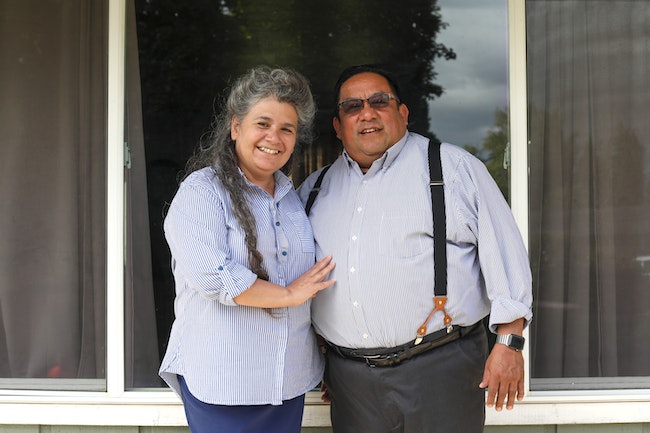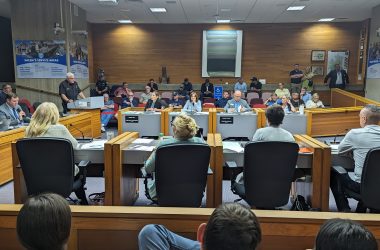 Pastor Jerry Miranda and wife Teresa pose for a photo outside of their Keizer home on Wednesday, July 1. (Amanda Loman/Salem Reporter)
Pastor Jerry Miranda and wife Teresa pose for a photo outside of their Keizer home on Wednesday, July 1. (Amanda Loman/Salem Reporter)
Thirteen days of Teresa Miranda’s life are blank.
The 56-year-old remembers her husband, Jerry, driving her to Salem Hospital the afternoon of Sunday, March 15, as she struggled to breathe. She was too weak to walk into the emergency room, instead needing a wheelchair to make it in.
Hospital workers opened the large double doors leading into the emergency department and wheeled her through. Her last memory of the moment is hearing a nurse tell her husband he couldn’t come with her.
“That’s the only place I guess you could say I felt fear,” she said.
The next memory Miranda has is waking up on her back in a hospital bed, as if she’d been sleeping. It was March 28.
For the Salem Hospital nurses and doctors who cared for her, Miranda’s case was an early sign of what they were up against as it became clear the coronavirus would spread to every corner of the U.S.
Nurse Sierra Schneider, the hospital’s intensive care unit coordinator, was working the day Miranda came in. Because her breathing was so weak, the emergency room staff quickly moved her to the ICU.
“Most critically ill patients, they get worse before they get better. She was already at that worse when they got there,” Schneider said. She could discuss the case because Miranda authorized Salem Hospital to disclose information about her treatment.
Only one week passed from the time Marion County’s first resident tested positive for the virus to when Miranda arrived for care. Hospital workers had been bracing for the disease but hadn’t yet seen serious cases.
Miranda was one of three people who came to the hospital that day with serious breathing problems. All three needed to be intubated, but Schneider said it was clear Miranda’s illness was the most critical.
At the time, tests for the coronavirus were in short supply and results often took three to four days. Schneider said Miranda had pneumonia in both lungs and acute respiratory distress syndrome, a condition where fluid builds up in the small air sacs where lungs exchange oxygen and carbon dioxide.
The coronavirus was their first suspect, Schneider said. As they waited for test results, she and the rest of Miranda’s treatment team set to work trying to get the woman breathing again.
They put Miranda on a ventilator. Schneider said even with the ventilator at 100%, Miranda’s lungs were so sick they were fighting the machine, not allowing oxygen to get in. They had to paralyze her entire body so the ventilator could aid her.
Every 12 hours, ICU nurses would try to wean her off the paralyzing drug to see how Miranda’s lungs fared, closely monitoring the amount of oxygen in her blood. The goal was to keep her blood saturated with 92% oxygen or more, but almost instantly after taking her off the paralyzing drug, her levels would drop down to as low as 70% oxygen.
“She could not keep her lungs open. She could not work on her own, without being paralyzed, with the ventilator,” Schneider said.
 Teresa Miranda embraces her husband Jerry as she’s released from Salem Hospital on April 2, 2020 following a serious case of COVID-19 (Amanda Loman/Special to Salem Reporter)
Teresa Miranda embraces her husband Jerry as she’s released from Salem Hospital on April 2, 2020 following a serious case of COVID-19 (Amanda Loman/Special to Salem Reporter)
Medical providers in the ICU are used to serious illness and even death. But Schneider said March 15 was a stressful day as she and her colleagues realized how serious the virus was.
“There’s a good chance we’re going to lose a lot of these patients. These are really sick patients,” Schneider remembered thinking.
When Miranda’s Covid test came back positive, Schneider said she was shocked the virus was already spreading in the Salem area.
“Maybe I was just really quite naïve, but I was just amazed it came to Salem so fast,” she said. She had heard of severe nursing home outbreaks in Seattle and Portland and worried Salem could become another New York or Italy, where hospitals were overflowing with patients.
Treatment options were limited and because the virus was so new, doctors had to rely more on anecdotal evidence than rigorous medical research for ideas of what might help. Schneider sat on a hospital committee that met twice weekly to review evidence and update protocols as the pandemic took hold in Salem.
They gave Miranda hydroxychloroquine, a malaria drug that at the time had some anecdotal evidence suggesting it could improve outcomes for Covid patients, though it can have serious cardiac side effects. Schneider said the committee “didn’t really like the evidence that much” for the drug, but at the time didn’t have better options.
To Schneider’s knowledge, Miranda was the first Covid patient to receive the drug at Salem Hospital. Schneider said they didn’t observe any benefit for Miranda or other patients who received hydroxychloroquine at Salem Hospital.
They also moved Miranda onto her stomach to aid in breathing.
Schneider cared for Miranda over three days, calling her husband, Jerry, to update him and put the phone on speaker so her children could sing to her. She said she spoke with Miranda as she cleaned and fed her, calling it “an honor” to care for patients who are too sick to take care of themselves.
“She didn’t even get a right to say yes, you are allowed to take care of me and to touch me and to clean me and to nurture me.” she said. “Even though she doesn’t know it, I talked to her about everything I did, held her hand, told her I talked to her husband and tried to still honor that she’s this person.”
Jerry was in quarantine at home. At night, when he couldn’t sleep, he prayed and read messages from family, friends and people who had heard about his wife’s plight around the world.
Schneider said the family separation was difficult for providers, who saw how it magnified the anxiety of having a relative so seriously ill.
“Not having family present and having to try to describe things and not having family members there, that was honestly quite heartbreaking,” she said.
Miranda’s condition was so poor when she came in that Schneider was shocked when she began to improve. After three days, she was moved off the paralyzing drug. In another week, she was off the ventilator.
“It was rather remarkable how quickly she turned around once she seemed to be past her peak,” Schneider said.
Miranda said her understanding was fuzzy when she first opened her eyes March 28. She recalled she’d been having trouble breathing and figured she was in the hospital, possibly in Portland. She still felt weak but said she was calm and knew she was being taken care of. Her first thought was about her husband.
“I was looking for him to see if he was around somewhere,” she said.
She believes nurses and doctors told her why she was in the hospital, but said she doesn’t remember any conversation because she was fading in and out of awareness. Being hospitalized was an unusual experience for Miranda, who said she has no chronic health conditions and had never before been unconscious or in the hospital for anything but giving birth to her children.
She didn’t realize she’d had the coronavirus until after she returned home.
On April 2, Miranda was released from the hospital. She lost 16 pounds and struggled with the effort of stepping from a wheelchair into the family’s car, shaking as Jerry settled her in with an oxygen tank.
At home, the Mirandas said their reunion was like getting married again. The hospital stay was the longest the two had been separated in 38 years of marriage.
Jerry Miranda said his wife needed help with every task during her first weeks at home. She was too weak to walk on her own. He brushed her hair, made her soft foods and helped her eat as she worked to regain her strength.
“The first day she ate a tortilla I was so happy,” Jerry Miranda said.
 Teresa Miranda’s daughter Stephanie and granddaughter Sofiah brush her hair on April 2, 2020 following her release from Salem Hospital (Courtesy/Jerry Miranda)
Teresa Miranda’s daughter Stephanie and granddaughter Sofiah brush her hair on April 2, 2020 following her release from Salem Hospital (Courtesy/Jerry Miranda)
The Mirandas normally have a busy life, with Jerry serving as pastor of Salem Tabernacle Church and Centro Pentecostal in Gresham. Teresa leads the church’s women’s ministry and works as an instructional assistant at Mary Eyre Elementary School.
But with church services on hold and both Mirandas required to quarantine at home for another two weeks, they had little to do but reconnect with each other. Jerry said it took about 10 days before his wife was strong enough to kiss him back.
“I call it our second honeymoon,” he said.
Salem Hospital providers now have months more experience caring for Covid patients and better data guiding their care.
They’re now treating coronavirus patients with remdesivir, an antiviral drug, and dexamethasone, a common steroid, said Dr. Tony Blair, the adult hospitalist medical director. Both drugs have shown promise in early studies at improving patients. Those drugs carry fewer serious side effects than hydroxychloroquine, which they’ve stopped using after more studies suggested its benefits were limited and risks high.
The hospital’s outcomes for Covid patients, even the most seriously ill, have been better than Schneider anticipated. As of June 29, Salem Hospital has cared for 149 Covid patients, with 48 of them in the ICU at some point during their illness, spokesman Elijah Penner said.
Their mortality rate is 12% of all patients and 19% of ICU patients. Some, like Miranda, have been near death before recovering.
Schneider said Miranda still stands out to her because of the speed of her recovery. She’s since cared for two Covid patients who spent 39 days in the ICU. A two-week stay, followed by at least a week recovering in a less intensive wing of the hospital, is not uncommon.
“The fact that she was that sick and was actually going home in two weeks was amazing. I don’t know if I’ve seen anybody do that,” Schneider said.
Miranda can still feel the virus’ effects on her body. Getting dressed in the morning takes most of her strength, and longer conversations leave her short of breath. Her lungs feel better, she said, but she’s still challenged to walk long distances and feels “slower” than before she got sick.
The Mirandas said they regularly get messages from other churches as people seek advice when a spouse or other loved one falls sick. Both say the experience has strengthened their bond and confirmed their faith in God.
“My faith has gotten greater, it’s growing so much more. Because every day I realized that I’m here because, you know, His mercy, His healing power,” she said.
Related coverage
Alone at home, Salem pastor prays as his wife fights for her life against the coronavirus
Separated for weeks, Salem couple reunited after wife’s “miracle” recovery from coronavirus
SUPPORT ESSENTIAL REPORTING FOR SALEM – A subscription starts at $5 a month for around-the-clock access to stories and email alerts sent directly to you. Your support matters. Go HERE.
Contact reporter Rachel Alexander: [email protected] or 503-575-1241.

Rachel Alexander is Salem Reporter’s managing editor. She joined Salem Reporter when it was founded in 2018 and covers city news, education, nonprofits and a little bit of everything else. She’s been a journalist in Oregon and Washington for a decade. Outside of work, she’s a skater and board member with Salem’s Cherry City Roller Derby and can often be found with her nose buried in a book.









